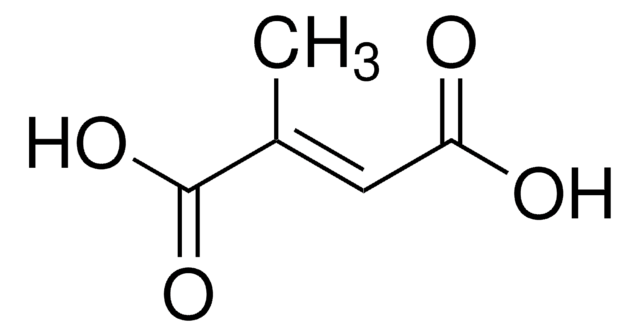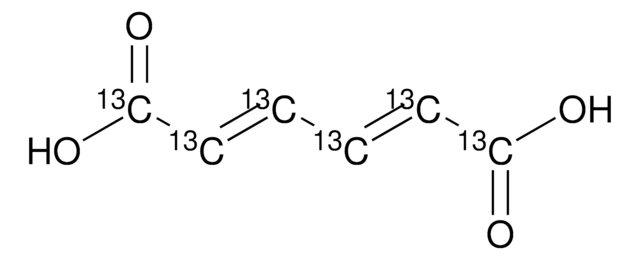15992
cis,cis-Muconic acid
≥97.0% (HPLC)
Sinónimos:
cis,cis-2,4-Hexadienedioic acid
Iniciar sesiónpara Ver la Fijación de precios por contrato y de la organización
About This Item
Fórmula empírica (notación de Hill):
C6H6O4
Número de CAS:
Peso molecular:
142.11
Beilstein/REAXYS Number:
1722246
MDL number:
UNSPSC Code:
12352100
PubChem Substance ID:
NACRES:
NA.22
Productos recomendados
Quality Level
assay
≥97.0% (HPLC)
mp
194-195 °C (lit.)
functional group
carboxylic acid
SMILES string
OC(=O)/C=C\C=C/C(O)=O
InChI
1S/C6H6O4/c7-5(8)3-1-2-4-6(9)10/h1-4H,(H,7,8)(H,9,10)/b3-1-,4-2-
InChI key
TXXHDPDFNKHHGW-CCAGOZQPSA-N
Categorías relacionadas
General description
cis,cis-Muconic acid is a naturally-occurring organic acid. It is also referred as 2E,4E-hexa-2,4-dienedioic acid. It is used in the manufacture of several widely-used consumer plastics. Its microbial production via extending shikimate pathway has been reported.
Application
- Biotechnological production methods: Research highlights various biotechnological approaches to enhance the synthesis of cis,cis-muconic acid, which can serve as a precursor for biodegradable polymers and other bio-based plastics, aligning with sustainable chemical manufacturing goals (Son et al., 2023).
- Industrial application in polymer industry: The potential application of cis,cis-muconic acid in the polymer industry is explored, focusing on its role as a precursor for manufacturing eco-friendly, bio-based plastics, thereby contributing to sustainable industrial practices (Palumbo et al., 2024).
signalword
Warning
hcodes
Hazard Classifications
Acute Tox. 4 Oral - Eye Irrit. 2 - Skin Irrit. 2 - STOT SE 3
target_organs
Respiratory system
Storage Class
11 - Combustible Solids
wgk_germany
WGK 3
flash_point_f
Not applicable
flash_point_c
Not applicable
ppe
dust mask type N95 (US), Eyeshields, Faceshields, Gloves
Elija entre una de las versiones más recientes:
¿Ya tiene este producto?
Encuentre la documentación para los productos que ha comprado recientemente en la Biblioteca de documentos.
Los clientes también vieron
Yuheng Lin et al.
Metabolic engineering, 23, 62-69 (2014-03-04)
cis,cis-Muconic acid (MA) and salicylic acid (SA) are naturally-occurring organic acids having great commercial value. MA is a potential platform chemical for the manufacture of several widely-used consumer plastics; while SA is mainly used for producing pharmaceuticals (for example, aspirin
Natalia Filipowicz et al.
Enzyme and microbial technology, 141, 109663-109663 (2020-10-15)
In this study, three psychrotolerant phenol-degrading yeast strains Candida subhashii (strain A011), Candida oregonenis (strain B021) and Schizoblastosporion starkeyi-henricii (strain L012) isolated from Rucianka peatland were examined to determine which alternative metabolic pathway for phenol biodegradation is used by these
Ahmad A Deeb et al.
Analytical and bioanalytical chemistry, 408(16), 4219-4232 (2016-04-22)
The presence of organic micropollutants and their transformation products (TPs) from biotic and abiotic processes in aquatic environments is receiving intense public and scientific attention. Yet a suitable sample preparation method that would enable extraction and enrichment of a wide
Tim Snoek et al.
Nucleic acids research, 48(1), e3-e3 (2019-11-30)
Allosteric transcription factors (aTFs) have proven widely applicable for biotechnology and synthetic biology as ligand-specific biosensors enabling real-time monitoring, selection and regulation of cellular metabolism. However, both the biosensor specificity and the correlation between ligand concentration and biosensor output signal
Rui Pereira et al.
Metabolic engineering, 56, 130-141 (2019-09-25)
Improving the growth phenotypes of microbes in high product concentrations is an essential design objective in the development of robust cell factories. However, the limited knowledge regarding tolerance mechanisms makes rational design of such traits complicated. Here, adaptive laboratory evolution
Nuestro equipo de científicos tiene experiencia en todas las áreas de investigación: Ciencias de la vida, Ciencia de los materiales, Síntesis química, Cromatografía, Analítica y muchas otras.
Póngase en contacto con el Servicio técnico












